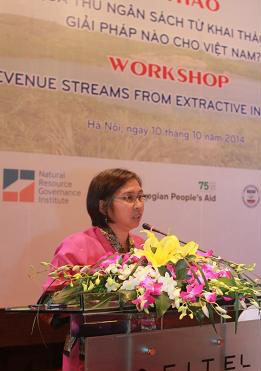ISRDS director presents paper in Vietnam

The workshop was organized to discuss the status of and enhancing the benefits from the extractive industry for Vietnam. In addition, since Vietnam is planning to join the Extractive Industry Transparency Initiative (EITI), it sought to learn from the experience of the Philippines which was admitted to the EITI as a candidate country on May 22, 2013 during the 6th EITI Global Conference in Sydney, Australia.
President Benigno Aquino created the Philippine EITI through EO 147, series of 2013. PH-EITI seeks to introduce greater transparency and accountability in the extractive industries (mining, oil and gas, coal) in the way government collects and companies pay taxes and other revenues from Extractive Industry (EI). In particular, the PH-EITI Multi-Stakeholder Group (MSG) provides business and civil society stakeholders a platform for engaging government in the implementation of EITI in the country. The PH-EITI is lodged with the Department of Finance. The CSO representatives come from Bantay Kita (BK), the broad coalition of civil society organizations advocating transparency and accountability in the extractive sector.
Assoc. Prof. Tabada said that by joining EITI, the governmentdemonstrates commitment to reform and anti-corruption, leading to improvements to the tax collection process, and enhanced trust and stability in a volatile sector; companies benefit from a level playing field and an improved and more stable investment climate in which they can better engage with citizens and civil society; and Filipino citizens and civil society organizations benefit from receiving reliable information about the extractives sector, and a multi-stakeholder platform where they can better hold the government and companies to account.
Tabada’s paper presentation consisted of three parts: legal framework for people’s participation in governance; the PH-EITI implementation; and the value of CSO participation in the EITI implementation.
First, Tabada said that the 1997 Philippine Constitution recognizes the role of civil society, particularly the youth, in nation building. Philippine laws, likewise, specify areas for people’s participation, i.e. Multipartite Monitoring Teams (MMTs).
In the second part, the points raised included the mandates of the PH-EITI MSG, composition of, selection process, and roles of the CSO representatives.
The third part highlighted the accomplishments of the CSO reps in terms of the conduct of subnational stakeholder consultations, capacity building by participating in workshops on EI governance, full participation in the monthly MSG meetings, and monitoring disclosures. She showed that participation is a step forward because it encourages civil society to participate continuously in government affairs while ensuring that government is responsive to the needs of the public especially the marginalized sectors.
Assoc. Prof. Tabada is a member of the BK Board of Trustees and CSO representative to the PH-EITI MSG. The ISRDS is a member of Bantay Kita.

